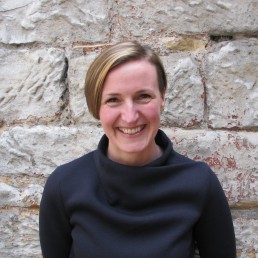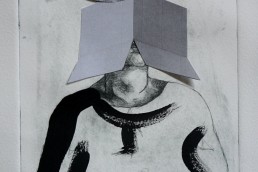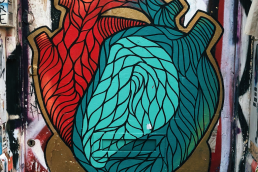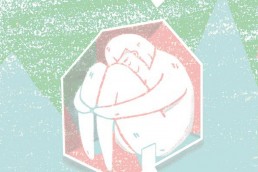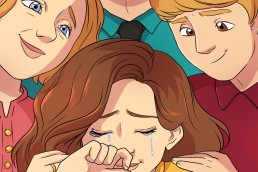Heather Pearson with Kate Majib
Photographs courtesy of Kate Majib
Q. As you know, raising awareness about the connections between mental health and creativity is a huge part of what Fearless Femme does, so it’ll be no surprise to you we were hugely moved by the story of how a young man’s illustration of how he visualized his brain during psychosis moved you to want work as a psychiatric nurse at the beginning of your career. Can you tell us about any other instances where creativity and mental health experiences have made intersections that become way points in your life?
A. Over the course of my career I have been fortunate to work alongside several amazing occupational therapists all of whom have worked tirelessly to support people with mental health difficulties to thrive through ‘meaningful’ activity. This activity can take many forms ranging from therapeutic group work or creative art, writing or music sessions. A common complaint for inpatients within our acute mental health wards is boredom and this is often where creativity as a tool to help peoples recovery can demonstrate real benefit. For example, working alongside individuals who struggle to express their feelings verbally but who use colour to convey an emotional state through an art group, or the person with an organic illness who is unable to communicate verbally at all but who can sing along word perfect to a song that resonates form their past. Participating in these sessions and being able to observe the first hand impact of this work has certainly gone a long way to inform how I work as a clinician.
More recently I am extremely proud that The Shaw Mind Foundation has been able to continue to support the Art Group in Newark. This group had been supported by Newark Mind but unfortunately when local Mind closed, the group was at risk of closure too. This is a group that uses art as a vehicle to engage and support people with mental health problems. The group is extremely sociable and several of the attendees would have little community contact without this group.
Q. The Shaw Mind Foundation and Fearless Femme have a lot in common; we both recognise the crisis in mental health for young people and want to create interventions to the stigmas often leading people to feeling alone, unable to cope or continue. The Shaw Mind Foundation has made a bold and brilliant pledge to significantly reduce the amount of suicides in the UK within ten years. The team at Fearless HQ have been so moved and inspired by the promise you’ve made here. Can you tell us how you plan to do that and what other organisations and individuals with shared values can do to help you achieve your goal?
A. I believe that shame is significant precursor to suicidal idealisation. Shame that the person is feeling the way they do, shame that they think they are letting people down and shame that they cannot reach out & seek help at that critical moment that can exist between life and death. When I think about what leads to shame – its stigma. Stigma is what prevents a person reaching out early for support when they start to feel unwell or recognise symptoms of relapse. If we address stigma we address shame. If we address shame we save lives. So how do we start to address stigma? Through education. I don’t mean a weekly Mental Health Education session although that is certainly part of it – it has to also be about how we instil an emotional literacy across an entire community, starting with schools; teachers, support staff, pupils and parents, so that we develop a culture where we eradicate the shame that is often experienced when becoming unwell.
“When I think about what leads to shame – its stigma. Stigma is what prevents a person reaching out early for support when they start to feel unwell or recognise symptoms of relapse. If we address stigma we address shame. If we address shame we save lives.”
We work with other organisations, schools and businesses to help shape a stigma busting approach – using my own clinical expertise and that of our trainer and speaker partners to develop a completely bespoke offer to address the challenges that they may face.
I encourage all interested groups and organisations to contact me to discuss how we could work together to address this crisis.
Q. What’s your favourite part in your working week in a mental health-focused setting and how do you personally cope when things are tough?
A. My favourite part of the week is working alongside my youth ambassadors – this is a group of young people all of whom have lived experience who act as ‘critical friends’, a check point to make sure that the direction of travel for the Foundation continues to meet the needs and expectations of young people – this is invaluable as they continually re-energise me with their ideas and passion.
When things get tough for me I try and take time to pause, this could be writing a list (BIG believer in list writing!) or going for a short walk with my head up – taking a moment to value my surroundings. When I feel my mood begin slip I seek support from my family as soon as possible, I try to identify positive things in each day and consciously share these with my family.
Q. In our work with volunteers we often experience the enormous privilege of working with people transitioning through self-awareness, gaining a sense that they matter, in part through understanding that what they create has value not just as a stand-alone piece of art or writing, but also as an essential cog in the engine of a community that’d be diminished without their unique involvement. You’re clearly a motivated person who knows her life and work make a difference. Can you share with us when you had a first sense that your life mattered enough for your actions to improve not just your experiences but those of others, too?
A. Some years ago when I was an acute inpatient mental health nurse I worked with a young women who was suicidal. She was unable to identify any reason for her survival and was firmly of the opinion that everyone would be better off without her. She was unable to recognise any protective factors in her life. The significance of her depressive state was such that she needed to be admitted to hospital in order to keep her safe although at this time she was so unwell she didn’t have the motivation to harm herself. During the course of her admission initially her mental state worsened, she stopped communicating completely and even struggled to walk. Her admission was over several months long during which I was able to work with her to gently and slowly encourage her to start to engage with life again. About a year after her discharge I bumped into her in town – she hugged me and said that I had saved her life simply by not giving up on her when so many others had.
Q. A huge part of what Fearless Femme do is research-based – we want to particularly understand what could be better in the policy contexts of young people’s lives to help them cope better as they transition into adulthood so resilience strengthens and empowers them for the rest of their lives. If you were PM for a day and could change or create one law to make a big, positive impact – to our mission and yours – what would you do?
A. All levels of education (nursery onwards) to deliver (age relevant) mental health education, as a stand alone lesson that embedded the development of psychological resilience and positive emotional literacy. This approach would ensure that the language that is used throughout a persons educational career to describe mental illness supported a societal shift whereby people felt able to reach out for help sooner.
Q. Some of our 2018 content explores failure and success and how we as a western society define and cope with both. Can you tell us what your attitudes are about these topics and if you have any words of wisdom you lean back on regularly to keep yourself grounded when things go wrong?
A. I recognise that I set myself very high personal levels of achievement & this means that I can easily fall back on self criticism when I deem myself to have failed. The key here for me if self awareness – I know myself well enough now to recognise when I am starting to be self critical and will endeavour to replace these negative thoughts with more self soothing language.
Q. Finally, thinking about mental health and creativity, what do you know to be true for you?
A. Creating, transforming or building something is important to me – I know that I can measure my value by the difference I make, this isn’t always the most emotionally helpful measurement and so it’s important that I continue to recognise that even the smallest step takes me nearer my destination.
Heather Pearson
Heather is based in Edinburgh and, through poems, prose and commentary, tells stories about womanhood, place, identity and change.
Kate Majid
After 32 years working as a mental health nurse in the NHS, Kate Majid became the only registered mental health nurse CEO of a mental health charity in england.
Kate’s incredible clinical background in the fast changing landscape that is the NHS means that she is uniquely placed to influence transformation from within the mental health charity sector.
Kate has a simple goal – to change the world for people with mental health problems and their carers, everything she has done to date has taken her one step closer to that goal. As CEO for The Shaw Mind Foundation she can continue this vital work and through her work alongside children and young people start to embed preventative strategies at an early age that will really make a difference.
Kate believes that the world can be changed – one connection, one conversation at a time.


